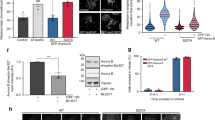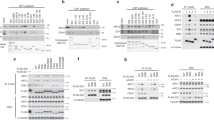Abstract
In fission yeast, meiosis is initiated by transcriptional activation of the mei3+ gene, under the combined influence of the four mating-type genes. The product of the mei3+ gene acts as a critical meiotic inducer by binding non-covalently to a newly identified protein kinase encoded by the ran1+ gene and inhibiting its enzymatic activity. Inactivation of the ran1+ protein kinase is both necessary and sufficient to divert a vegetative cell from mitotic division to meiotic differentiation.
This is a preview of subscription content, access via your institution
Access options
Subscribe to this journal
Receive 51 print issues and online access
$199.00 per year
only $3.90 per issue
Buy this article
- Purchase on Springer Link
- Instant access to full article PDF
Prices may be subject to local taxes which are calculated during checkout
Similar content being viewed by others
References
Leupold, U. C. R. Lab. Carlsberg Ser. Physiol. 24, 381–480 (1950).
Beach, D. & Nurse, P. Nature 290, 140–142 (1981).
Bresch, C., Miller, G. & Egel, R. Molec. gen. Genet. 102, 301–306 (1968).
Iino, Y. & Yamamoto, M. Molec. gen. Genet. 198, 416–421 (1985).
Nurse, P. Molec. gen. Genet. 198, 497–502 (1985).
Beach, D., Rodgers, L. & Gould, J. Curr. Genet. 10, 297–311 (1985).
Beach, D., Nurse, P. & Egel, R. Nature 296, 682–683 (1982).
Beach, D. Nature 303, 682–687 (1983).
McLeod, M. & Beach, D. EMBO J. 6, 729–736 (1987).
Shimoda, C. & Uehira, M. Molec. gen. Genet. 201, 353–356 (1985).
McLeod, M. & Beach, D. EMBO J. 5, 3645–3671 (1986).
Egel, R. Planta 98, 89–96 (1971).
Egel, R. Molec. gen. Genet. 121, 277–284 (1973).
Egel, R. Curr. Genet. 8, 199–203 (1984).
Kelly, M., Burke, J., Smith, M., Klar, A. & Beach, D. EMBO J. (in the press).
Herskowitz, I. in Specialized Cell Types; Their Use in Addressing Problems in Cell Biology (ed. Hicks, J.) 625–656 (Liss, New York, 1986).
Nasmyth, K. & Shore, D. Science 237, 1162–1170 (1987).
Egel, R. & Egel-Mitani, M. Expl Cell Res. 88, 127–134 (1974).
Iino, Y. & Yamamoto, M. Proc. natn. Acad. Sci. U.S.A. 82, 2247–2451 (1985).
Russell, P. Nature 301, 167–169 (1983).
Towbin, H., Staehelin, T. & Gordon, J. Proc. natn. Acad. Sci. U.S.A. 76, 4350–4354 (1979).
Zoller, M. & Smith, M. Gene 3, 479–488 (1984).
Weinmaster, G., Zoller, M. & Pawson, T. EMBO J. 5, 1772–1779 (1985).
Snyder, M., Bishop, J., McGrath, J. & Levinson, A. Molec. cell. Biol. 5, 1772–1779 (1985).
Lischwe, M. & Sung, M. J. biol. Chem. 152, 4976–4980 (1977).
Walsh, D. et al. J. biol. Chem. 246, 1977–1985 (1971).
Scott, J., Glaccum, M., Fischer, E. & Krebs, E. Proc. natn. Acad. Sci. U.S.A. 83, 1613–1616 (1986).
Whitehouse, S., Feramisco, J., Casnellie, J., Krebs, E. & Walsh, D. J. biol. Chem. 258, 3693–3701 (1983).
Whitehouse, S. & Walsh, D. J. biol. Chem. 258, 3682–3692 (1983).
Matsumoto, K., Uno, I. & Ishikawa, T. Cell 32, 417–423 (1983).
Maller, J. & Krebs, E. J. biol. Chem. 252, 1712–1718 (1977).
Gehring, W. Science 236, 1245–1252 (1987).
Shoji, S. et al. Proc. natn. Acad. Sci. U.S.A. 78, 848–851 (1981).
Toda, T., Cameron, S., Sass, P., Zoller, M. & Wigler, M., Cell 50, 277–287 (1987).
Draetta, G., Brizuela, L., Potashkin, J. & Beach, D. Cell 50, 319–325 (1987).
Lee, M. & Nurse, P. Nature 327, 31–35 (1987).
Beach, D., Piper, M. & Nurse, P. Molec. gen. Genet. 187, 326–329 (1982).
Sipiczki, M. & Ferenczy, L. Molec. gen. Genet. 151, 77–81 (1987).
Gutz, H., Heslot, H., Leupold, U. & Loprieno, N. in Handbook of Genetics Vol. 1 (ed. King, R. C.) 395–446 (Plenum, New York, 1974).
Losson, R. & Lacroute, F. Cell 32, 371–377 (1983).
Mitchison, M. Meth. Cell Physiol. 4, 131–165 (1970).
Laemmli, U. Nature 227, 680–685 (1970).
Author information
Authors and Affiliations
Rights and permissions
About this article
Cite this article
McLeod, M., Beach, D. A specific inhibitor of the ran1+ protein kinase regulates entry into meiosis in Schizosaccharomyces pombe. Nature 332, 509–514 (1988). https://doi.org/10.1038/332509a0
Received:
Accepted:
Issue Date:
DOI: https://doi.org/10.1038/332509a0
This article is cited by
-
Gamete fusion triggers bipartite transcription factor assembly to block re-fertilization
Nature (2018)
-
Computational modelling of meiotic entry and commitment
Scientific Reports (2018)
-
Long noncoding RNA-based chromatin control of germ cell differentiation: a yeast perspective
Chromosome Research (2013)
-
Programmed fluctuations in sense/antisense transcript ratios drive sexual differentiation in S. pombe
Molecular Systems Biology (2011)
-
Molecular mechanisms underlying the mitosis–meiosis decision
Chromosome Research (2007)
Comments
By submitting a comment you agree to abide by our Terms and Community Guidelines. If you find something abusive or that does not comply with our terms or guidelines please flag it as inappropriate.



